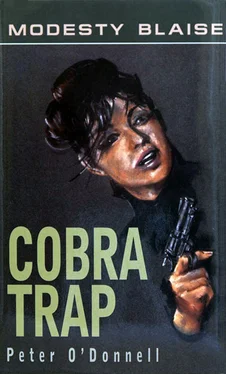She was highly skilled at living off the land, and according to Willie Garvin was well able to eat things no hyena would touch, but here in the Pyrenees food had presented no problems. Certainly this stretch of land through the slopes of the foothills was remote, but there was always a small farm within six or seven miles, and occasional villages on tributaries of the Salat and Ariege rivers. She carried a little money with her, but the French farm families were intrigued by her, and hospitable, and she had found it hard to pay for whatever food they provided.
As she sat in the cave on that first day, watching a narrow beam of sunlight fall across her thighs, she knew that she had been imprisoned here to die slowly. Somebody had put out a contract on her for an aggravated killing, and whoever was handling the contract had planned it carefully. Only Willie Garvin and Weng, her houseboy, knew what she was doing and where.
So she had been followed from London, which called for considerable organisation, and then tailed expertly to Lacourt, where she had left her car, and on into the mountains until the contractors had found the right moment to strike.
It had been skilfully done, and clearly there had been teamwork with radio communication, for somebody had reconnoitred ahead and found the cave. She did not wonder what other method of aggravated killing might have been chosen if the cave had not presented such a perfect opportunity, for that was unimportant. The contractors and whoever employed them were also unimportant. They could wait till later—if there was to be a later. Nothing mattered now except survival.
Her pack had been taken. She had no food, no water, nothing but the clothes she wore—bra, pants and a cotton dress. The boulder was immovable. A search of the cave had produced little of use; dust, gravel, scattered pieces of rock, feathers, a skeleton of a bird, animal droppings, two or three sticks, and—the only sign of human existence—the empty cigarette packet of a long extinct brand.
Unless somebody freed her by moving the boulder she would die. The chance of anyone passing nearby, a local or walker like herself, was remote but not impossible. The problem would be to know if this happened, and even through the widest gap between rock and cavemouth, perhaps two inches, she could see only a narrow segment of thinly grassed earth extending for some twenty yards before sloping down out of her sight.
Willie Garvin would be concerned if she failed to contact him after two weeks. He would call the small hotel at Lacourt where she had left the car, then come out to find her, but she had followed no particular route, and the chances that he would stumble upon the cave were infinitesimal; except that he was Willie Garvin, who had a remarkable intuition for anything concerning her, who might well follow the route she had taken, and who would instantly be curious about a large boulder in an unnatural position.
But that, if it happened, was many days in the future. Her sole task must be to remain alive for as long as possible, so that the infinitesimal chance might grow to become minute. To do this she would need all her mental skills and all the abilities she had learned from Sivaji, the ancient guru in the Thar desert north of Jodhpur, for without a controlled slowing of heartbeat and breathing no human could survive more than a few days without water.
So it was that on the tenth day, when she roused from the coma she had lain in from dusk to an hour after dawn, she sat up slowly and waited for bodyheat to return. She was wearing only bra and pants, for her dress had been pushed with a stick through a ground level gap to one side of the cavemouth. She drew the dress in carefully through the gap and began to suck from it the heavy dew it had collected overnight.
When she had taken all the moisture it would yield she laid it aside and began to work on the task she had begun eight days ago, moving very slowly and with minimum mental and physical effort, listening carefully for any sound from outside.
One of the sticks was of cane, and with a sharp stone she had cut about four inches from one end of it. Now, using the quill from a feather, she was boring out the central pith from the cut piece. Most of this was now hollow, and she had cut a thin notch close to the open end to make a whistle. She did not know how effectively it would work, but it had been good for her morale to do something undemanding but positive during her listeningout periods. These were from early morning till midmorning, then from midafternoon till dusk. The rest of the day and night she was comatose.
She worked with a blank mind, without hope, without despair, and at about eight o'clock when the whistle was finished she tried it once, and allowed herself a moment of pleasure at the shrill sound it produced. Beside her lay the rest of the cane with a piece torn from her dress tied to one end. Got the whistle and the flag now, Willie, she allowed herself to think. Come soon. Then she withdrew her mind from all thought and stimuli except for the listening.
It was two hours after dawn next day when a sound triggered her to wakefulness. At first she was unsure that she had heard anything, but then it came again, a crunching as of wheels on a rocky track, from somewhere to the right of the cavemouth and drawing nearer, but below the slope where the ground dipped. Normally she could produce a taxihailing whistle of earsplitting quality with fingers to her mouth, but not with parched lips and drained energy. This was why she had contrived the little cane instrument.
Now she pushed her flag through the gap at the top of the cavemouth and knelt with her face close to the gap. It was a huge effort to blow, and to keep blowing, to use the other hand to wave the flag from side to side and to crane her neck in an effort to see through the gap. After perhaps fifteen seconds she paused to listen, chest heaving and weakness flooding her limbs.
The crunching sound had stopped. Again she began to whistle and wave her flag. She could see nothing through the gap, nothing, and could feel despair gathering to pounce when, startlingly near, she heard a gruff voice speak with rising astonishment, " Il'ya quelqu 'un la? Dedans?"
She could manage only a husky whisper as she said in French, "M'sieu, I am trapped in a cave behind this boulder. Can you hear me?"
Part of a face came into her view on the far side of the little gap, an old and weatherbeaten face beneath a shock of thick grey hair. " Une femme? How in the name of God-?"
She broke in. "Please, M'sieu. I have been here for some days and I am very weak. Please bring help to move the boulder."
The grey head nodded. "Wait, mam'selle, a few moments only. Napoleon and I will see to it." The face vanished, but the voice continued briefly and she had the odd impression that the man had said, "Bloody hell!" in English.
Slowly pulling on her dress, she knew that she must be disorientated and had misheard. It was not surprising, for the last two minutes had produced the effect of shock in her, and she was reaching within herself now to regain control.
The man had referred to "Napoleon", a friend presumably, and had spoken of a "few moments only". This she could not understand. It would take four strong men to roll that boulder away without implements for leverage. She was mentally preparing what she would say to him on his return when there came a clanking sound and strong, workworn ringers pushed a length of chain through the gap.
The voice said, "Pass it round the rock, mam'selle, and back to me through the little space on the other side." A throaty chuckle. "It is good fortune that I came to haul timber today."
She took the end of the chain and drew it across the boulder, relaxing now in the knowledge that the man knew what he was doing and she could leave it in his hands. A second chain was fed through to her, and after a few moments she saw them both tighten round the boulder. From outside she could hear him talking to somebody, encouraging, cajoling, and it was suddenly clear to her that this was Napoleon, a beast of burden.
Читать дальше












